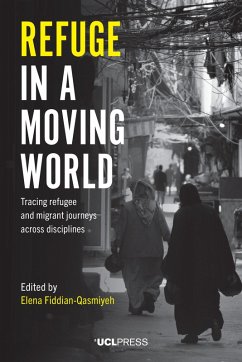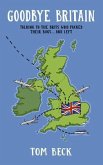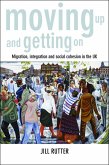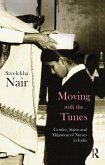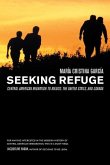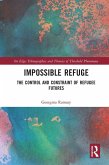Refuge in a Moving World draws together more than thirty contributions from multiple disciplines and fields of research and practice to discuss different ways of engaging with, and responding to, migration and displacement.
The volume combines critical reflections on the complexities of conceptualizing processes and experiences of (forced) migration, with detailed analyses of these experiences in contemporary and historical settings from around the world. Through interdisciplinary approaches and methodologies - including participatory research, poetic and spatial interventions, ethnography, theatre, discourse analysis and visual methods - the volume documents the complexities of refugees' and migrants' journeys. This includes a particular focus on how people inhabit and negotiate everyday life in cities, towns, camps and informal settlements across the Middle East and North Africa, Southern and Eastern Africa, and Europe.
A key dynamic documented throughout the book is the multiple ways that responses to displacement are enacted by people with personal or family experiences of (forced) migration. These people appear in many roles: researchers, writers and artists, teachers, solidarians, first responders, NGO practitioners, neighbours and/or friends. Through the application of historically and spatially sensitive, intersectional and interdisciplinary lenses, the contributors explore the ways that different people - across axes of religion, sexuality, gender and age - experience and respond to their own situations and to those of other people, in the context of diverse power structures and structural inequalities on the local, national and international level.
Ultimately, Refuge in a Moving World argues that working collaboratively through interdisciplinary approaches and methodologies has the potential to develop nuanced understandings of processes of migration and displacement, and, in turn, to encourage more sustainable modes of responding to our moving world.
Praise for Refuge in a Moving World
'An important resource for those researching displacement, but it is also a good read for those seeking to better understand, prepare for or stay in solidarity with those who have had to seek refuge and make a home on different soil.' LSE Review of Books
'Interdisciplinarity is [...] one of this book's most significant contributions. Placing social scientists, urban planners, artists, activists, and other interlocutors in conversation with each other greatly enriches the scholarship on forced migration and displacement. ... The second most important contribution of this volume is its ability to go beyond academia and to speak to a wider public. Bringing the scholarly discourse about displacement outside academia and making it accessible to a wider public is greatly needed to undermine the concept of "crisis" and the binary understandings of refugeehood and refugees.'
Refuge
'a testament to the exciting development of innovative methods and approaches demonstrating a potential to move our field forward by expanding how knowledge is produced, particularly through creative methods and approaches...the book's strength is the refugee-centred approach taken throughout'
International Journal of Refugee Law
'available as open access, the anthology will be a valuable resource for students across many disciplines, especially those wanting to probe beyond legal categories, experiment with collaborative and visual approaches, and challenge literary and narrative conventions. For those researching forced displacement, this collection can also put them on the track to the colonial origins of camps and the question of why the search for refuge in a moving world is still with us.'
Journal of the Royal Anthropological Institute (JRAI)
The volume combines critical reflections on the complexities of conceptualizing processes and experiences of (forced) migration, with detailed analyses of these experiences in contemporary and historical settings from around the world. Through interdisciplinary approaches and methodologies - including participatory research, poetic and spatial interventions, ethnography, theatre, discourse analysis and visual methods - the volume documents the complexities of refugees' and migrants' journeys. This includes a particular focus on how people inhabit and negotiate everyday life in cities, towns, camps and informal settlements across the Middle East and North Africa, Southern and Eastern Africa, and Europe.
A key dynamic documented throughout the book is the multiple ways that responses to displacement are enacted by people with personal or family experiences of (forced) migration. These people appear in many roles: researchers, writers and artists, teachers, solidarians, first responders, NGO practitioners, neighbours and/or friends. Through the application of historically and spatially sensitive, intersectional and interdisciplinary lenses, the contributors explore the ways that different people - across axes of religion, sexuality, gender and age - experience and respond to their own situations and to those of other people, in the context of diverse power structures and structural inequalities on the local, national and international level.
Ultimately, Refuge in a Moving World argues that working collaboratively through interdisciplinary approaches and methodologies has the potential to develop nuanced understandings of processes of migration and displacement, and, in turn, to encourage more sustainable modes of responding to our moving world.
Praise for Refuge in a Moving World
'An important resource for those researching displacement, but it is also a good read for those seeking to better understand, prepare for or stay in solidarity with those who have had to seek refuge and make a home on different soil.' LSE Review of Books
'Interdisciplinarity is [...] one of this book's most significant contributions. Placing social scientists, urban planners, artists, activists, and other interlocutors in conversation with each other greatly enriches the scholarship on forced migration and displacement. ... The second most important contribution of this volume is its ability to go beyond academia and to speak to a wider public. Bringing the scholarly discourse about displacement outside academia and making it accessible to a wider public is greatly needed to undermine the concept of "crisis" and the binary understandings of refugeehood and refugees.'
Refuge
'a testament to the exciting development of innovative methods and approaches demonstrating a potential to move our field forward by expanding how knowledge is produced, particularly through creative methods and approaches...the book's strength is the refugee-centred approach taken throughout'
International Journal of Refugee Law
'available as open access, the anthology will be a valuable resource for students across many disciplines, especially those wanting to probe beyond legal categories, experiment with collaborative and visual approaches, and challenge literary and narrative conventions. For those researching forced displacement, this collection can also put them on the track to the colonial origins of camps and the question of why the search for refuge in a moving world is still with us.'
Journal of the Royal Anthropological Institute (JRAI)
Dieser Download kann aus rechtlichen Gründen nur mit Rechnungsadresse in A, D ausgeliefert werden.

